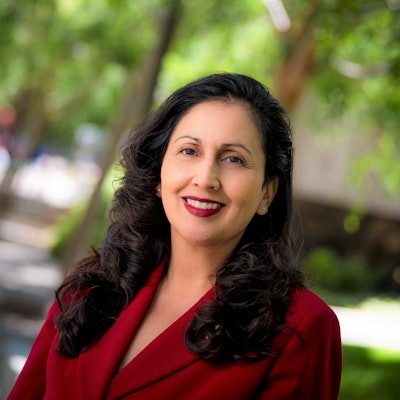The University of California at San Diego (UCSD) has been given two grants totaling $700,000 to improve its faculty diversity.
 Dr. Frances Contreras
Dr. Frances ContrerasThe grants were funded by the University of California Office of the President through the UC Advancing Faculty Diversity grant program, according to UCSD.
According to UCSD, the first grant – a one-time fund of $500,000 – will be used to help hire a cluster of 10-12 faculty who focus their research on “racial/ethnic disparities in STEM fields with a significant focus on the Black diaspora and African American communities.”
“I think that it’s really a unique opportunity for our campus to really consider a cluster hire around academic programming that really seeks to increase the connection between African American studies and STEM,” said Dr. Frances Contreras, professor of education studies and associate vice chancellor at UCSD’s Center for Faculty Diversity and Inclusion. “And I think that this is really important and it’s where the future of STEM needs to be headed.”
Contreras is a project lead for both initiatives, and the Center for Faculty Diversity and Inclusion is a key partner in both, according to UCSD.
“The grant is not only about recruiting new faculty. It’s about the African American studies program,” said Dr. Thandeka K. Chapman, professor of education studies and director of the UCSD African American studies minor program. “These hires will be specifically connected to African American and Black diaspora studies at UCSD. And that means that we’ll be asking them to teach classes that entertain topics that are interwoven between issues of race and STEM.”
Chapman is one of five project leads of the $500,000 initiative titled, “Advancing Diverse Faculty, Curricula and Research through a Cluster Hire at UC San Diego.”
According to UCSD, the faculty will be hired for the following departments: Division of Physical Sciences, Division of Biological Sciences, Jacobs School of Engineering, Skaggs School of Pharmacy and Pharmaceutical Sciences, School of Medicine, the new Wertheim School of Public Health and Human Longevity Science, Scripps Institution of Oceanography and the Halıcıoğlu Data Science Institute.
Chapman said that these new hires are partially meant to provide students more options for the diversity, equity and inclusion course requirement to graduate.
 Dr. Thandeka K. Chapman
Dr. Thandeka K. Chapman“Right now, we don’t have very many of those courses in STEM,” Chapman said. “Most of the courses – there are over 100 courses – but almost all of them are in the social sciences, arts and humanities. Part of the initiative for these faculty hires is to bring a broader spectrum of research, teaching and service to UCSD students across campus, that’s focused on African American and Black diasporic studies.”
While the first grant addresses recruitment, the second deals with retention. Headed by the UCSD Center for Faculty Diversity and Inclusion, the $200,000 grant aims to increase retention of underrepresented faculty.
“We really are focusing in that grant on our efforts to retain our faculty of color, retain our underrepresented women and faculty of color on our campus,” Contreras said.
“So much goes into recruitment and getting faculty to come to an institution. And we feel that, through our center, we’re trying to make sure that retention is also front and center, that we want to create a climate and environment for faculty to thrive and feel welcome.”
The $200,000 grant, named “A Holistic Strategy for Academic Success and Retention at UC San Diego,” will build upon and expand the Center’s ongoing work, implementing efforts such as faculty mentorship programs, virtual webinars and workshops and launching a male allyship network, Contreras added.
Chapman said the recruitment-related initiative – which she said had received “outstanding support” – is a two-year process and that the goal will be to split up the hires over that period. The hope is to roll out the first five searches by the end of the quarter, she said.
“We’re looking to submit the job positions and have those job positions out into different forms of advertisement by the end of this quarter,” by December, Chapman said.
Moreover, Chapman said that the majority of students who “are African American or claim the Black diaspora” are in STEM and the social sciences.
“And they have gone underserved with these types of academic conversations and academic mentoring for a long time,” she said. “It really is just a timely approach to bringing Blackness in STEM to the forefront of issues in academia.”















